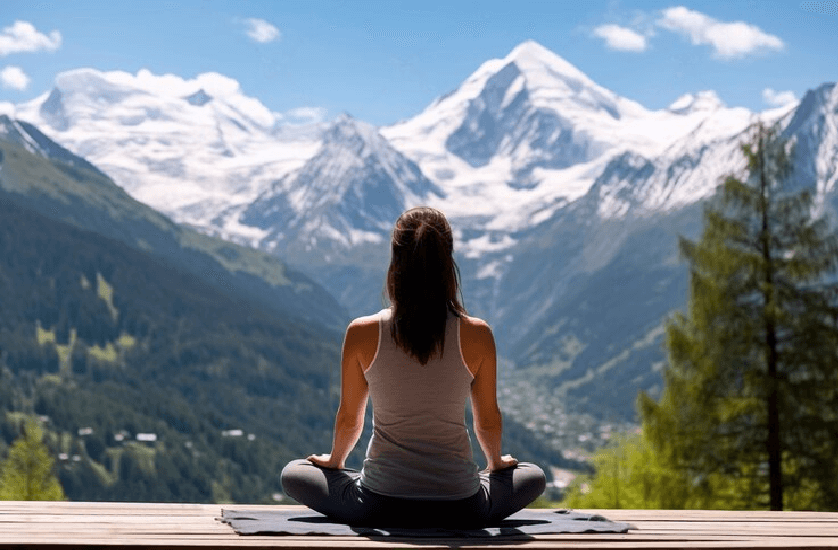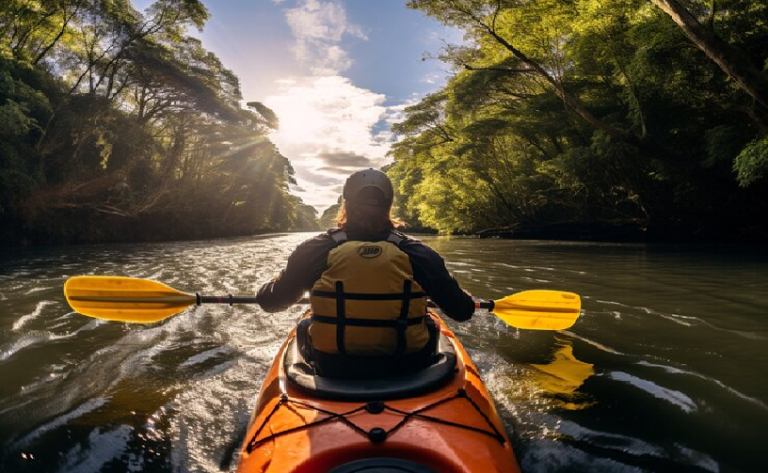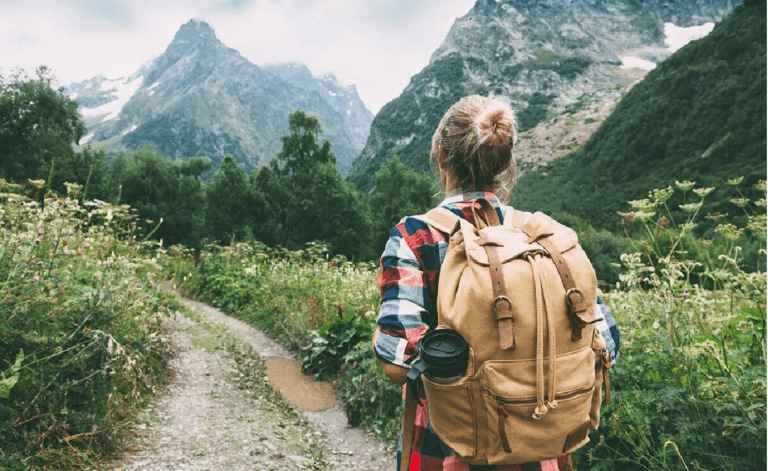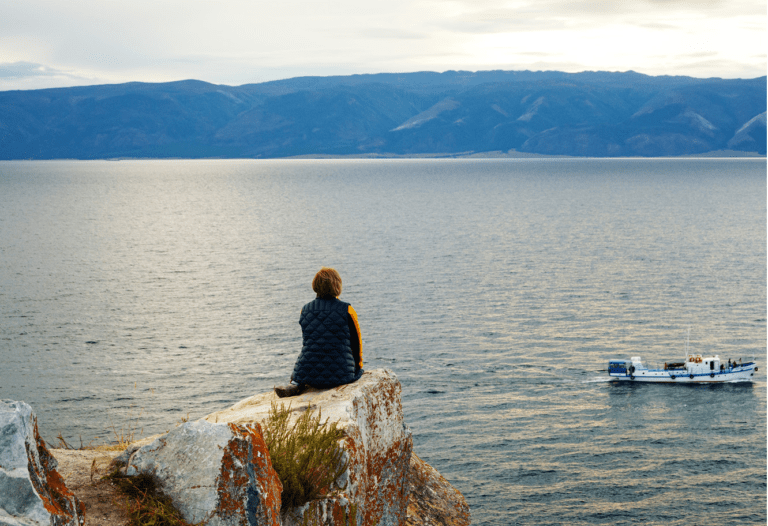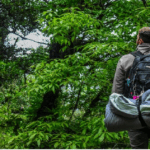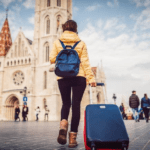
I. Introduction
Solo travel for introverts provides a unique opportunity to embrace solitude and embark on a journey of self-discovery. It allows introverted individuals to break free from the pressures of everyday life and find solace in their own company.
This form of travel caters to introverts’ need for introspection and offers a chance to recharge their energy in isolation.
With introvert-friendly destinations and the freedom to explore alone, solo travel for introverts paves the way for making meaningful connections, overcoming challenges, and finding balance as an introverted traveler.
Join us as we delve into the world of solo travel for introverts, discovering quiet destinations and unraveling the wonders of traveling on your own in 2024.
II. Benefits of Solo Travel for Introverts
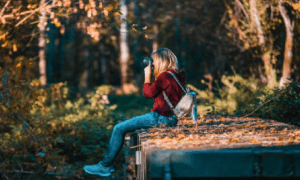
1. Embracing Isolation and Self-Reflection:
One of the major advantages of solo travel for introverts is the opportunity to embrace isolation and engage in self-reflection.
Introverts generally flourish in quiet, contemplative surroundings, and solo travel provides the ideal atmosphere for this.
Being alone allows introverts to recharge their batteries, examine their thoughts and emotions, and get a better understanding of themselves. It allows one to take a break from the constant social activities and enjoy the relaxation of one’s own company.
2. Freedom to Explore at Your Own Leisure
Solo travel allows introverts to explore destinations at their own leisure. Introverts can plan an itinerary that suits their interests and comfort level without having to accommodate the cultural preferences of others or adhere to a rigorous schedule.
They can fully immerse themselves in experiences and sights that appeal to them individually, whether it is going to museums, going on leisurely walks, or tasting regional food.
This independence allows introverts to thoroughly appreciate their trip experience without feeling rushed or overwhelmed.
3. Indulging in Personal Interests Without Compromise:
When traveling with others, compromises are frequently required to accommodate individual preferences and interests.
However, solitary travel eliminates the necessity for concessions, allowing introverts to pursue their unique interests without restriction.
Introverts can create their own plan, whether it is visiting specialized museums, attending cultural events, or exploring off-the-beaten-path areas.
This level of liberty allows introverts to have meaningful and gratifying experiences that are true to their personality.
4. Enhanced Self-Confidence and Personal Growth:
Solo travel for introverts can be a transforming experience that promotes self-confidence and nurtures personal growth.
Leaving one’s comfort zone and navigating unexpected settings alone might be intimidating at first, but ultimately liberating.
It motivates introverts to get over their barriers, socialize publicly on their terms, and develop essential life skills like problem-solving, adaptability, and self-reliance.
Each successful solo travel increases resilience and strengthens introverts’ belief in their talents, resulting in personal growth and increased confidence.
5. Deepened Connection with the Surroundings:
Introverts have a strong awareness of their environment and a yearning for meaningful interactions.
Introverts can fully immerse themselves in the local culture, engage with locals on a deeper level, and gain a more thorough understanding of the location by traveling alone.
Without the distractions of regular interaction, introverts may observe and absorb the distinctive ambiance, traditions, and customs of the places they visit.
This strong connection with one’s environment frequently leads to more real and memorable travel experiences. The Introverts can embark on transforming experiences that correspond with their distinct tastes and contribute to their overall well-being by embracing solitary travel.
III. Preparing for a Solo Trip
When preparing for solo travel for introverts, it is crucial to investigate and select destinations that cater to your preferences and provide a welcoming atmosphere for introverted travelers.
Here are a few tips specifically tailored to solo travel for introverts:
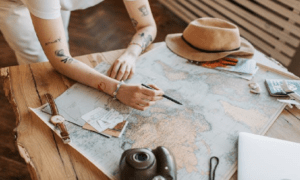
6. Identifying and Choosing Introvert-Friendly Locations
It is crucial to investigate and select destinations that suit your preferences and offers a welcoming atmosphere for introverted travelers when getting ready for a solo break as an introvert.
Here are a few tips:
7. Peaceful and Serene Locations:
Look for destinations that offer tranquility and a calm atmosphere. Natural environments, such as mountains, beaches, or peaceful countryside, can be perfect for introverts seeking quietness and introspection.
8. Cultural and historical sites:
If you’re interested in art, history, or culture, seek out locations with museums, art galleries, historical landmarks, or architectural wonders. Exploring these locations at your own speed provides for a deeper relationship with the environment.
9. Off-Season Travel:
Consider visiting popular tourist destinations during the off-season. This allows you to avoid large crowds and enjoy a more peaceful experience, especially at famous attractions that are usually crowded. Generally, this also will reduce the cost of the trip.
10. Retreat Centers or Wellness Resorts:
Look for retreat centers or wellness resorts that cater to introverted individuals. These places often provide opportunities for relaxation, meditation, yoga, and personal reflection.
11. Planning a Flexible Itinerary:
As an introvert, having a flexible itinerary can help you maintain a sense of freedom and adaptability during your solo trip. Here’s how to plan your itinerary:
12. Prioritize Personal Time:
Allocate ample time for personal reflection, relaxation, and pursuing activities that align with your interests. This could include reading, journaling, exploring nature, or engaging in creative pursuits.
13. Avoid Overbooking:
Don’t feel pressured to fill every hour of your trip with activities. Leave room for spontaneous discoveries and unplanned experiences. Embrace the freedom to change your plans based on your mood and energy levels.
14. Slow Travel:
Instead of rushing from one destination to another, consider adopting a slow travel approach. Spend a long time in every location to fully appreciate the sights, engage with the locals, and become immersed in the culture.
15. Packing Essentials for Comfort and Convenience:
Packing the right essentials can enhance your comfort and convenience during your solo trip. Here are some items to consider:
16. Comfortable Clothing:
Pack clothes that make you feel comfortable and confident. Layering options are useful for adapting to different weather conditions.
17. Travel Entertainment:
Bring along books, e-books, music, podcasts, or movies that you enjoy. These can provide entertainment during transit or quiet evenings in your accommodation.
18. Travel notebook:
Carry a small notebook-cum-diary to capture your thoughts, reflections, and memorable experiences during your solo journey. For introverts, writing can be a beneficial outlet.
19. Self-Care Items:
Include items like a reusable water bottle, travel-sized toiletries, a travel pillow, earplugs, and a sleep mask to make sure a good night’s rest and self-care on the travel.
Remember, the most important aspect of preparing for solo travel for introverts is to prioritize your own needs and preferences.
Embrace the opportunity for self-discovery, personal growth, and enjoying the world at your own pace.
IV Navigating Introvert-Specific Challenges

20. Managing homecoming and loneliness while on a solo trip can be extremely difficult for introverts.
Here are some suggestions for handling these emotions:
21. Embrace isolation:
Accept loneliness as an opportunity for introspection and personal development rather than battling it.
Make use of this time to do things you want to do, like reading, journaling, or exploring the outdoors.
22. Stay connected with loved ones:
Even if you can prefer alone, it is important to keep up relationships with your loved ones.
To share your thoughts and feelings with them on a regular basis, schedule video calls or SMS. This can help you feel less homesick.
23. Selectively interact with others:
It is acceptable to take pauses from socializing and give your private time a top priority. Strike a balance between being with other people and setting aside time for isolation.
24. Engage in social interactions selectively:
It’s okay to take breaks from socializing and prioritize your alone time. Find a balance between spending time with others and carving out moments of isolation for yourself.
25. Managing Social Environments and Meeting New People:
For introverts, interacting socially and meeting new people might be difficult. Here are various approaches to handling these circumstances:
26. Begin modestly:
Start by striking up discussions with locals or other tourists in relaxed settings, like the common room of a hostel or when participating in group activities. Increase your interactions as you become more at ease
27. Look for shared interests.
Find topics of conversation by looking for shared hobbies or pastimes. As a result, encounters may become more meaningful and enjoyable for both parties
28. Take breaks when necessary:
It is okay to step away from social encounters to refuel. To recoup your energy and mental focus, excuse yourself and go to a quiet area or participate in solo hobbies
29. Dealing with Language Obstacles and Cultural Differences:
For introverted travelers, dealing with language obstacles and cultural differences can be difficult. Here are some suggestions for handling similar circumstances:
30. Develop your vocabulary:
Learn a few fundamental words and phrases in the language to help you express your demands and respect the local way of life. This effort has a big potential to close the language gap.
31. Watch and adjust:
To better comprehend the cultural environment, pay attention to the regional customs and habits. Stay loyal to your introverted character while adjusting to cultural expectations. You can navigate cultural differences by using respectful gestures and an open mind.
32. Find a point of connection:
Despite differences in language and culture, there are frequently shared experiences and passions that can bring individuals together.
To connect with locals and other visitors, look for areas of comparable interest and experiences.
Remember, solo travel for introverts is a unique experience, and it’s important to honor your own needs and preferences. Take things at your own pace, and do not feel obliged to live up to social standards.
Embrace the journey as an opportunity for personal growth, self-discovery, and meaningful connections on your own terms.
V Finding Balance: Isolation and Social Interaction

Finding a balance between isolation and social interaction is essential for introverts during solo travel.
Here are some strategies that can help introverts maintain that balance:
33. Maintaining a Healthy Balance Between Personal Space and Socializing:
Introverts value their privacy and private time, which is essential for recharging.
Introverts need to set aside time while traveling solo for their isolation. Find activities you like to engage in independently such as taking leisurely walks, reading books, or simply observing your surroundings.
34. Taking Part in Group Activities That Are Related to Your Personal Interests:
It is possible to socialize while yet honoring your introverted character by participating in group activities. Look for trips, courses, or classes with groups that share your interests.
By doing so, you can meet people who have similar interests to you and build genuine connections without becoming overburdened by continual social interaction.
35. Using Technology and Online Communities to Build Connections:
Introverts can utilize technology to build connections with people while still engaging in social activities that feel natural to them. Join social media or online travel communities devoted to the destinations of the trip.
This gives you the chance to converse with other travelers, get travel tips, and perhaps even run across folks who have similar interests. Online platforms also give you the freedom to interact at your own speed and level of comfort.
Additionally, technology can be used to keep in touch with friends and family back home, providing a sense of connection and support during solo travel for introverts.
Schedule video calls or share updates through messaging apps to maintain social connections without sacrificing your need for isolation.
VI Ensuring Safety and Security

Ensuring safety and security is crucial when traveling solo, especially for introverts. Here are some tips to help you stay safe and secure during your solo journey:
36. Researching Cultural Norms and Destination Safety:
Before leaving on your trip, it is important to do some research about the safety conditions at your destination.
Search for trustworthy information by visiting websites for local tourism, government travel advisories, and travel discussion groups.
Know any hazards that might exist, such as those associated with political unrest or high crime areas.
Learn about the cultural norms and traditions of the region you are visiting to avoid unintentional demeaning or misunderstanding.
37. Staying Aware and Following Your Gut Feelings:
You could already be more conscious of your surroundings as an introvert. Pay attention to your gut feelings and trust your instincts.
If someone or anything makes you feel uneasy, it is preferable to proceed on the side of caution and leave.
Be watchful in busy places, keep an eye on your possessions, and respect other people’s personal space.
38. Using Technology and Communication Tools for Added Security:
Using technology effectively can help to increase your safety and security while traveling alone. Listed below are a few ideas:
Tell a dependable family member or friend about your itinerary and other crucial information. Throughout your journey, keep them informed of your whereabouts.
To get around in strange places, use a trustworthy navigation app. Make careful to download offline maps in case there is a problem with your internet connection.
Utilize your smartphone to install safety-related applications. These could consist of emergency contacts, nearby emergency services, interpreting services, and even personal safety apps that let you notify others of an emergency.
Use social media or messaging apps to stay in touch with people. Join online travel communities or groups where you may get information, tips, and meetup ideas from other travelers or locals.
39. Making copies of your passport, visas, tickets, and itineraries before departing.
Make an electronic copy and a physical one, when possible. If something were to happen these copies will make it much easier to get replacements quickly.
Email the electronic copies to yourself so that you can access them anywhere. Send an extra copy of everything to your friend or family member in charge of your itinerary.
40. Be judicious when giving out personal information.
Being a smart traveler may mean using a few creative lies. There is no reason, for example, to broadcast the fact that you’re traveling alone.
Instead, ask for directions by saying “You’re meeting a friend.” If someone asks you where you’re staying at night, let them know that “you aren’t sure yet, you’re just exploring.” Being a good traveler doesn’t mean exposing yourself unnecessarily to danger.
41. While there are always exceptions, in general:
Don’t tell people where you’re sleeping.
Don’t tell people you’re traveling alone.
Don’t broadcast your status as a foreigner or traveler
Don’t talk about your money or valuables, even obliquely.
Don’t tell people where you will be the next few days.
Remember, it’s always better to be over-prepared when it comes to safety and security.
While these measures can significantly reduce risks, it’s important to remain adaptable and open-minded during your solo travel experience.
Trust yourself, stay cautious, and embrace the journey with confidence.
VII. Making the Most of Solo Experiences

42. Immersion in Local Culture and Activities:
Immersion in local culture and activities can improve your solo travel experience greatly.
It is advisable to gain knowledge about the culture, history, and traditions of the place of your trip.
Participate in neighborhood events and activities including fairs, markets, and performances of the local culture.
Understanding the local culture will help you develop strong relationships with the community and the environment, as well as extend your perspective.
43. Exploring Off-the-Beaten-Path locales:
Exploring off-the-beaten-path locales can provide new and fresh experiences, while popular tourist spots surely have their allure. These unknown gems typically provide more intimate and private contact with the setting.
Investigate lesser-known areas, seek advice from locals, or join tours that focus on seeing off-the-beaten-path locations.
By deviating from the traditional tourist route, you will have the opportunity to discover hidden gems and have valuable experiences.
44. Understanding Locals and Embracing Unique Experiences:
Solo travel gives an opportunity to meet and connect with locals. Talk to locals about where to go, dine at neighborhood restaurants, and try regional cuisine.
Locals can introduce you to authentic cultural experiences as well as provide insightful guidance and insider information.
Take advantage of the opportunity to learn from them by participating in a traditional craft session, visiting a community event, or simply starting up a casual conversation.
These contacts will enhance your journey by increasing your appreciation for and knowledge of different cultures.
Remember, solo travel for introverts allows you the freedom to engage deeply with the local culture, creating meaningful connections and lifelong memories along the way.
While immersing in local culture and activities, it’s important to be respectful and mindful of local customs and traditions.
Observe and follow any cultural norms, dress appropriately, and show appreciation for the local way of life.
Approach each experience with an open mind and a willingness to embrace the unfamiliar, which is the outcome of this article.
VIII. Self-Care and Mindfulness
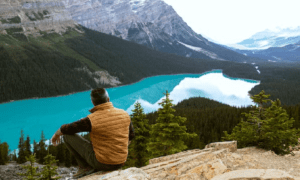
When going on solo travel as an introvert, it’s essential to prioritize self-care and mindfulness.
Taking care of your well-being and creating a peaceful and rejuvenating environment can make your solo trip a more enjoyable and fulfilling experience.
Here are some tips for practicing self-care and mindfulness while traveling alone:
45. Finding Quiet Accommodations for solo travel for Introverts:
Choosing the correct lodging is critical in establishing a relaxing and comfortable environment for introverted travelers.
Look for accommodations with a tranquil ambiance, such as quiet hostels, homestays in tranquil settings, or boutique hotels tucked away from the hustle and bustle.
After a long day of traveling, having a tranquil area to retreat to might provide much-needed solace to introverts.
46. Practicing Mindfulness and Self-Reflection:
Solo travel is an excellent approach for introverts to practice attention and introspection. Every day, set aside some time to focus on the present, take in your surroundings and really appreciate the event.
Practice meditation, writing, or simply sitting in a park and enjoying nature. This can improve your general well-being by calming the mind, lowering stress, and reducing anxiety.
47. Engaging in Recharging and Rejuvenating Activities:
Introverts frequently recharge by engaging in activities that correspond with their interests and passions. Make time for activities that bring you delight and renew your energy while traveling alone.
It may be reading a book in a comfortable café, taking your time touring a museum or art gallery, taking a tranquil walk in nature, or engaging in a creative hobby such as photography or painting.
Arrange these items in descending order of importance to ensure that you remain satisfied and happy on your solo vacation.
48. Setting Limits and Allowing Alone Time:
It is critical for introverts to set limits and allow themselves some private time while traveling alone. Do not feel obligated to be social all the time or to participate in activities that deplete your energy.
Allow yourself to decline invites or spend peaceful evenings in your lodging, enjoying your own company.
Balancing social engagements with adequate private time will allow you to recharge and retain a sense of balance during your journey.
49. Personal Well-Being Enhancement for solo travel for Introverts:
When traveling alone, keep your physical and mental well-being in mind. Eat good meals, remain hydrated, and get enough rest to maintain a healthy lifestyle.
Carry vital self-care things with you, such as a nice book, a favorite song, or a comfortable object from home.
Take calming baths, practice yoga or stretching, or treat yourself to a spa day as a self-care ritual. These simple self-care routines will leave you feeling refreshed and calm.
Remember, solo travel for introverts can be a transformative and rewarding experience. By incorporating self-care and mindfulness into your journey, you can create a harmonious balance between exploration and personal well-being, ensuring a memorable and fulfilling adventure.
IX. Overcoming Introvert Stereotypes and Empowering Yourself
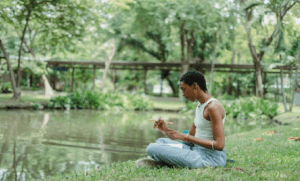
50. Embracing Introversion as a Strength in solo travel for Introverts:
Introversion is often misunderstood and overshadowed by extroversion in our society.
However, it is essential to recognize and embrace introversion as a unique strength rather than a weakness.
Here are some ways to overcome introvert stereotypes and empower yourself:
51. Self-Acceptance:
Accept and embrace your introverted nature. Understand that introversion is a personality trait, not a flaw. Recognize that introverts have their own set of strengths, such as deep thinking, creativity, empathy, and excellent listening skills.
52. Set Boundaries:
Introverts may need more private time to recharge and process information. Learn to set boundaries and communicate your needs to others. It’s okay to decline social invitations when you feel overwhelmed, and it’s important to prioritize your well-being
53. Self-Care:
Engage in self-care practices that align with your introverted nature. Find activities that recharge you, such as reading, writing, spending time in nature, practicing mindfulness, or pursuing hobbies that bring you joy and fulfillment.
54. Find Your Tribe:
Seek out like-minded individuals who appreciate and understand introversion. Connect with other introverts through online communities, social groups, or hobby-based organizations. Surrounding yourself with people who respect and value your introverted nature can be empowering.
55. Develop Social Skills:
While introverts may naturally gravitate towards isolation, it’s still important to develop social skills. Practice active listening, effective communication, and assertiveness.
Remember that introversion is not synonymous with shyness, and you can engage in meaningful social interactions when you choose to.
56. Challenge Yourself:
Stepping outside your comfort zone from time to time can be beneficial for personal growth. Gradually expose yourself to new experiences and social situations that align with your interests.
Pushing your boundaries in a controlled manner can help you build confidence and broaden your horizons.
57. Celebrate Your Strengths:
Acknowledge and celebrate the strengths that come with introversion. Embrace your ability to deeply reflect, think critically, and cultivate meaningful connections.
Recognize that introversion can be a valuable asset in many aspects of life, such as problem-solving, creativity, and leadership.
Remember, introversion is a natural and valid personality trait. By embracing and empowering yourself as an introvert, you can lead a fulfilling and authentic life that aligns with your unique strengths and preferences.
FAQs:
Is solo travel good for introverts?
Yes, solo travel can be beneficial for introverts. It provides them with the opportunity to explore new places at their own pace, enjoy solitary activities, and recharge their energy through personal reflection. It allows introverts to step out of their comfort zones and grow personally while embracing moments of solitude.
How do introverts enjoy solo travel?
Introverts can make the most of solo travel by planning activities that align with their interests. They can focus on visiting quieter and more serene locations, engaging in activities like hiking, reading, or photography. It’s important for introverts to create an itinerary that includes enough downtime for self-reflection and relaxation.
Tips for introverts traveling alone?
When introverts travel alone, it’s helpful to choose accommodations that offer privacy and quietness. Creating a flexible schedule that allows for breaks and alone time is key. Engaging in activities like walking tours, visiting museums, or enjoying local cuisine can provide enjoyable yet less overwhelming experiences for introverted travelers.
What are the best solo travel destinations for introverts?
Some of the best solo travel destinations for introverts include places with natural beauty, tranquil environments, and opportunities for introspection. Destinations like Kyoto (Japan), Santorini (Greece), or Banff National Park (Canada) offer picturesque landscapes and peaceful settings perfect for introverted travelers.
Solo travel or group travel for introverts?
Solo travel often appeals more to introverts due to the freedom it offers for personal exploration and solitary activities. While group travel can provide social interactions, solo travel allows introverts to fully immerse themselves in their surroundings and recharge as needed.
How to overcome introverted tendencies while traveling alone?
To overcome introverted tendencies while traveling alone, introverts can gradually challenge themselves to interact with locals and fellow travelers. Engaging in small talk, joining group activities, or participating in guided tours can help introverts build social confidence and create meaningful connections.
Solo travel safety tips for introverts?
Introverts should prioritize safety by researching destinations, staying in well-reviewed accommodations, and sharing their travel itineraries with trusted friends or family. Keeping personal belongings secure and being cautious in unfamiliar environments are essential safety practices for introverted solo travelers.
What are some solo travel activities suitable for introverts?
Introverted solo travelers can enjoy activities like exploring botanical gardens, visiting art galleries, taking peaceful walks in nature, journaling, attending local cultural events, and indulging in spa treatments. These activities provide opportunities for relaxation and self-discovery.
Managing social interactions during solo travel as an introvert? Introverts can manage social interactions by setting boundaries and taking breaks as needed. They can choose accommodations with private spaces to recharge, engage in activities that allow for solitude, and use techniques like mindfulness to navigate social situations with ease.
Planning a budget-friendly solo trip for introverts?
Introverts can plan a budget-friendly solo trip by opting for off-peak travel times, using cost-effective accommodation options like hostels or Airbnb, preparing simple meals instead of dining out, and researching free or low-cost activities available at their chosen destination.
How do I recharge my energy as an introvert while traveling solo?
Introverts can recharge by scheduling downtime in their itinerary. This could involve reading a book, taking a leisurely walk, meditating, or simply enjoying a quiet moment in a cozy café. Prioritizing self-care and alone time is essential for introverts to maintain their energy levels during solo travel.
Dealing with loneliness during solo travel for introverts?
Loneliness can be managed by connecting with others through online travel communities or local meetups. Introverts can also find comfort in journaling or creative activities, reaching out to friends and family digitally, and reminding themselves that moments of solitude can be valuable for personal growth.
What are the benefits of solo travel for introverted individuals?
Solo travel offers introverts the opportunity to escape the demands of daily life, connect with their inner selves, and build self-confidence through independent decision-making. It allows them to create their own itineraries, embrace new experiences on their terms, and find moments of solitude in beautiful destinations.
Finding solitude while solo traveling as an introvert?
Introverted travelers can find solitude by exploring less crowded areas, visiting local parks or nature reserves, and engaging in activities during off-peak hours. Researching destinations known for their peaceful ambiance and incorporating moments of quiet reflection into the itinerary can help introverts find the solitude they seek.
Balancing sightseeing and personal time during solo travel for introverts?
Introverts can achieve a balance between sightseeing and personal time by creating a flexible itinerary. They can dedicate specific time slots for exploring landmarks and attractions while also scheduling breaks for relaxation and introspection. This balance ensures that introverted travelers can enjoy both the external experiences and the internal reflections that solo travel offers.
Conclusion
Solo travel for introverts is a transformative experience that offers the perfect opportunity to recharge and reflect in solitude. By venturing out on their own, introverted travelers can escape the pressures of daily life and find freedom by embracing their introspective nature.
With solo travel for introverts, the journey becomes a catalyst for self-discovery and personal growth. It provides a space for introverts to embrace their independence, explore destinations with a quiet charm, and embark on soul-stirring adventures.
So, if you’re an introvert seeking a transformative travel experience, don’t hesitate to embark on a solo adventure. Embrace the freedom of solitude, immerse yourself in introvert-friendly destinations, and witness the power of self-reflection and personal growth.
Solo travel for introverts is not just a means of exploration; it’s a path to embracing solitude, finding your inner voice, and creating unforgettable memories along the way. Embark on your journey of self-discovery, and let solo travel for introverts be your guiding compass in 2024.

